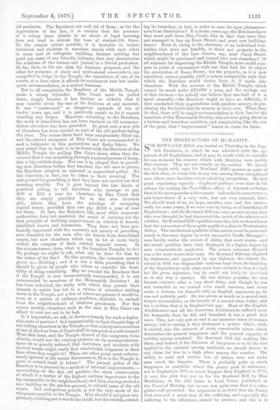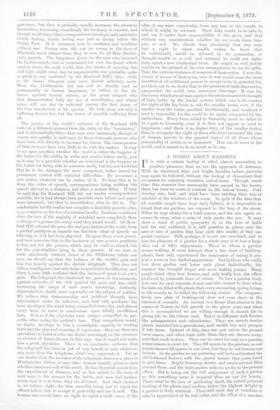THE BENEFACTORS OF HUMANITY.
SIR ROWLAND HILL was buried on Thursday in the Eng- lish Pantheon, to which he was admitted with the ap- proval of all Englishmen, and it may be worth while to consider for one moment the reasons which with thinking men justify that consent. They are not exactly on the surface. We should not, to begin with, rate Sir Rowland Hill's powers as quite of the first class, or count him in any way among those exceptional men whose mere faculties extort admiring recognition. He had great organising capacity—displayed perhaps even more in his scheme for making the Post-Offices offices of internal exchange than in his more popular achievement—indomitable perseverance, and benevolence of a very wide, but not very unusual, kind. We should. most of us, we hope, sacrifice ease and live strenu- ously for some years, if we were sure by doing so of benefiting all Englishmen ; and Sir Rowland Hill was sure, as sure as any man who ever thought he had discovered the secret of the whence and whither. Sir Rowland Hill's qualities were fine, but we do notknow that the possession of them quite justified a place in Westminster Abbey. The intellectual qualities of his nature must be possessed nearly in the same degree by every successful Traffic Manager— men hardly realise the extent of ability that work wants—and the moral qualities have been displayed in a higher degree by men comparatively neglected. The prison reformer Howard was a far more benevolent man. Sir Rowland Hill was slighted by statesmen, and oppressed by one Cabinet—his virtual dis- missal in 1841 was disgraceful—and was kept from the headship of the Department with what must have seemed to him for half his life gross injustice ; but he could not fairly be described as in any way a martyr. He was always popular, his idea became concrete after a very short delay, and though he was not rewarded as we reward even small warriors, and never made a fortune for himself, still, as English payments go, he was not unfairly paid. Ho was given as much as a second-rate lawyer accumulates, or the inconie of a second-class Judge, and for a civilian that is in England fair pay. Most of the English Abolitionists and all the American Abolitionists suffered. more for humanity than he did, and benefited it, too, a great deal more. They not only put an end to an immense mass of human misery, but in ending it they destroyed a system which, while it existed, was the outwork of every conceivable abuse which diminishes the general happiness and the general capacity of nobility among mankind. Sir Rowland Hill did nothing like them, and indeed, if the diffusion of happiness is to be the test applied to the eminent among mankind, we should demur to any claim for him to a high place among the number. The ability to send and receive lots of letters does not make man much the happier. There is probably quite as much happiness in countries where the penny post is unknown ; nor is England in 1875 so much happier than England in 1775. A very fine plea was put in for Sir Rowland Hill by Miss Martineau, in the able letter to Lord Truro, published in the Times of Monday, but we are not quite sure that it is alto- gether well grounded. Her argument is, in brief, that the Penny Post removed a great deal of the suffering, and especially the suffering to the affections, caused by absence, and this is in
part true ; but then it probably equally increases the absences themselves, increasing exceedingly the tendency to wander, and though we all fancy that correspondence developes and maintains family feeling, family feeling was just as strong before the Penny Post. It is strongest now in countries and localities .without ono. Young men did not go wrong in the days of Elizabeth much oftener than they do now, for all Miss Martin- eau's periods. The happiness given by the man who invented the lucifer-match, and so terminated for ever the dread, which used to worry the early world, that the means of securing fire and light might seine day be unprocurable, was probably quite as great as any conferred by Sir Rowland Hill's idea ; while to Sir James Simpson man owes almost infinitely more. Even the Abolitionists did not add so directly and so permanently to human happiness, or rather, to the de- fences against human misery, as the great surgeon who first demonstrated fully the use of aufesthetics, and whose name will one day be reckoned among the first dozen of the true benefactors of his species. He took away not only a suffering from a few, but the terror of possible suffering from
The justice of the world's estimate of Sir Rowland Hill rests on a different ground from the claim of the "benefactor," and is substantially this,—that man owes immensely, though of course not equally in each case, to those fortunate persons who have been able directly to increase his forces. The consequences of that increase have very little to do with the matter. It may be an open question whether the world is either the happier or the better for the ability to write and receive letters easily, just as it may be a question whether an individual is the happier or the better for being able to converse easily, but it is not doubtful that he is the stronger, the more competent, better armed for permanent contest With material difficulties. He possesses a new power, whatever use he makes of it. To deny this is to deny the value of speech, correspondence being nothing but speech uttered to a distance, and after a certain delay. It may be said that Sir Rowland Hill did not render correspondence possible, for it had, always been possible since letters and paper were invented ; but that is, nevertheless, what ho did do. The comfortable hardly realise how complete a disability poverty often is, us complete as the loss of a natural faculty. Deafness would not close the ears of the majority of mankind more completely than a charge of a guinea for every word they heard would. Sir Row- land Hill released the poor, the real population of the world, from a partial paralysis as regards one function—that of speech—as fettering as if it had been physical. He gave them a new power, and men perceive that to the bestower of new powers gratitude is due, not for the powers, which may be used, or abused, but for the potentialities lying in those powers. If we were to write absolutely without dread of the Philistines before our eyes, we should say that the balance of the world's gain and loss was heavily against the electric telegraph. That does not diffuse intelligence, but only helps to accelerate its diffusion; and there is very little evidence that the increased speed is as yet a gain. The telegraph has increased the power of Governments against subjects, of the rich against the poor, and has, while increasing the range of each man's knowledge, distinctly diminished its depth, more especially on the subject of politics. We believe that statesmanship and political thought have deteriorated under its influence, and that only quickness has been developed, the mind being compelled every day, and almost every hour, to come to conclusions upon totally insuffiCient data. It is as if the physician were always compelled to pre- scribe after seeing his patient's face. That compulsion would, no doubt, develop° in him a remarkable sagacity in reading faces and the physical meaning of expression—they say there are specialists in London who can decide unerringly on the presence or absence of heart-disease in this way—but it would not make him a great physician. There is no conclusive evidence that the telegraph has been as yet of any. benefit to man whatever, any more than the telephone, which may supersede it. Yet no one doubts that the inventor of the telegraph deserves a place in Westminster Abbey, or any other honour usually given to men who have deserved well of the world. He has liberated speech from the impediment of distance, and so has added to the force of each man, to his armour for the battle, and men feel instinc- tively that it is in force they are deficient And their instinct
we believe, right, the true morality being not to reject the offered talent, but to accept it gratefully and use it well. The human race would have no right to reject a sixth sense, if the
offer of one were conceivable, from any fear of the results to which it might be misused. Their duty would be to take it, and use it under their responsibility to the giver, and that without any consideration whether its use made them hap- pier or not. We should deny absolutely that any man had a right to reject wealth, unless he knew that he individually would be debased by its possession, or thought wealth in se evil, and certainly he could not right- fully reject a now intellectual force. He might as well justify suicide on the ground of his own incompetence to use his gifts. Take the extreme instance of weapons of destruction. A new dis- covery of means of destroying men in war would seem the most doubtful of all additional powers to accept or to be grateful for, yet there can be no doubt that to the greatest of such discoveries, gunpowder, the world owes enormous blessings. It was the discovery which armed man against the predomivance of strength of limb, broke up the feudal system, which was in its essence the right of the big brute to rule the smaller brute, even if the smaller were the better qualified intellectually, and rendered it next to impossible for the world to be again conquered by the barbarians. Every force added to humanity must be taken to be a gain to humanity, even if it does not appear to tend to happiness ; and there is no higher duty, of the smaller duties, than to recognise the right of those who have increased the sum of human powers to the general regard of all those whose potentiality of action is so increased. Man can do more in the world, and is meant to do as much as he can.































 Previous page
Previous page